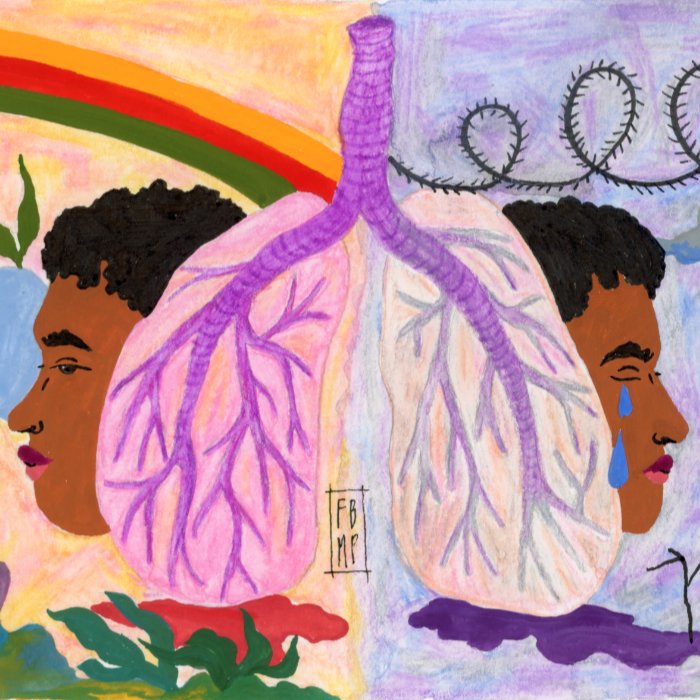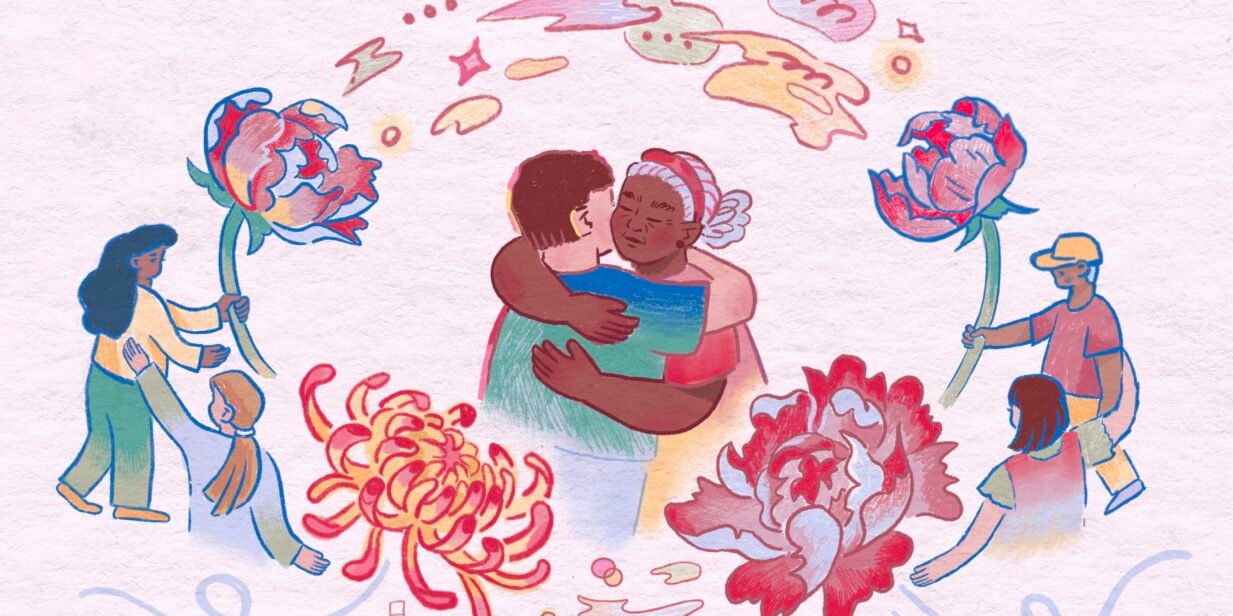What is health justice?
Health justice is a movement that seeks to name and disrupt the conditions that produce mass ill-health and suffering. It sees health not only as an individual concern that should be remedied by engagement with medical institutions once we become unwell, but as something that should be proactively embedded on a structural and community level.
The majority of the world’s sickness and suffering is not biologically random or inevitable. It is produced by what we call “social determinants” – like state violence, poverty and poor working and living conditions. Due to large-scale forces like capitalism, colonialism and the climate injustices, many people do not have access to the resources we all need to be well, like clean air, safe drinking water, nourishing food, freedom from oppression and spaces for creativity and community. People of colour and those living in the Global South are more likely to experience these forms of organised vulnerability and harm, so bear the brunt of health inequalities.
How does health and access to health affect people intersectionally?
Health justice also means addressing disparities in care. Wealth opens up more care options, granting access to private healthcare and healing practices. Meanwhile, those living in poverty are likely to endure long waiting lists to access underfunded services that are often punishing and oppressive in nature.
Many migrants and people of colour are deprived of access to health services in the UK due to “hostile environment” and “Prevent” policies. In a future where health justice is a reality, we would all have access to the care that we desired, and resources would not be gatekept within institutions that collaborate with the interests of the capitalist state.
It is also important that we link health justice to disability justice, a movement that takes a radical and intersectional approach, led by the wisdom and genius of disabled people, towards our collective liberation.
Disability justice is critical of capitalistic medicine’s linear focus on the ‘cure or be useless’ model of illness and disability. Instead, we are invited to design and organise our environments, infrastructures and communities to support the thriving and flourishing of disabled and chronically sick people – to make the world itself more liveable.
What is healing justice?
By bridging health and healing justice we can interrupt the harms that disproportionately affect marginalised communities whilst building access, equity and infrastructures to enable us all to be well. Healing justice also invites us to reimagine and repair the sites and spaces where our health is generated and nourished beyond medicalisation.
Healing justice is “an evolving political framework that … seeks to transform, intervene and respond to generational trauma and violence in our movements, communities and lives – and to regenerate our traditions of liberatory and resiliency practices that have been lost or stolen.” This framework evolved from organisers in the US, including the Black Queer Feminist cultural memory worker Cara Page and the broader Kindred Southern Healing Justice Collective, and gave language to a long legacy of work within movements and communities in the UK building capacity for and with marginalised people.
How has our access to/quality of health changed in recent years?
Societal conditions, such as increased austerity, climate breakdown, and the ongoing privatisation of public health systems, have exacerbated the inequitable access to public health provisions – especially for those who are marginalised.
COVID-19, as a seemingly indiscriminate public health crisis, complicated generalised notions or ideologies that we were “all in this together.” Marginalised communities were disproportionately dying and being made disabled, overpoliced, securitised, and receiving less or poorer quality treatment – as well as navigating the consequences of organised vulnerability such as loss of work, exposure as frontline workers, overcrowded homes, and distress etc.
Findings from Healing Justice Ldn’s work reveal the demand from communities to work on issues such as disability, loss and bereavement, gender justice and survivor work, land and spatial justice (particularly housing), access to rest and play as prominent health justice facets that affect our communities disproportionately and sometimes fatally.
We are hearted to see increased mobilisation connecting health to systemic and structural issues – including the level of community responses, through mutual aid, and local, self-organised initiatives around physical and mental health, and wellness.
These lifeline, people-powered interventions are a response to organised abandonment from the state – which has the structural power and resources to make public health provisions available for all of us, accessibility and at scale. Yet, in the face of increased privatisation of the NHS, securitisation of health through the hostile environment, violent welfare reforms, increased isolation and divestment from community resources (including GP services), access to our public health is increasingly restricted and denied.
Migrants in the UK face further and increasing barriers accessing healthcare through hostile environment policies such as the NHS surcharge and migrant charging in the NHS. The conditions migrants face under these policies, including the stresses of poor housing infrastructure, limitations on the right to work, and financial exploitation, contribute to ill health. For more information about how organisers and healthcare providers are resisting these policies, follow Patients not Passports.
What role can unions play in this?
Trade unions and trade unionism are often reproducing the same dynamics of racial and ableist capitalism that we seek to dismantle. A health justice orientation would ask – how do we design work and roles towards collaboration, redistribution, supporting our needs, care and cultivating imagination and collective liberation?
Much of this vision and work is happening across the trade union movement and within and against the formal structures. Collective building, branch building, bargaining, protesting and striking are all processes workers use towards healthier relationships and material conditions in work, that also increase our capacity for healthier relationships and material conditions outside of work, at local and systemic levels.
How does this connect to other movements and workers’ rights?
In building towards health justice and collective liberation, we have to see and understand the multiple ways in which our bodies exist and live. The role of our labour is key and cannot be separated from our role in relationship to one another and the structures, dynamics and material realities we create.
Beyond workers’ rights, we need agency, safety, belonging and dignity in how and what we create and produce. Health justice, and access to health infrastructure, in the context of our working lives means not having our dignity and worth measured by capitalist notions of productivity. It means having bodily autonomy, personal and collective agency in designing and enacting the services, vocations, institutions and crafts we want, hospicing and transitioning away from the ones we don’t, and experiencing remuneration not as a reward for discipline, but as a means towards resourcing lives that can thrive beyond work.
In our shared efforts to build alternatives we can draw strength from movements and practices that are attempting to build these life-affirming infrastructures. In the UK we are deeply encouraged by movements working on growing shared health justice capacities including the work of Docs Not Cops, MedAct, Race and Health, Reproductive Justice Initiative among the work of many many others. Likewise a broader ecosystem of peers are attending to other structural components of building health structures including Civic Square, Dark Matter Labs, Skin Deep, Kin Structures, Resolve Collective, Migrants in Culture, MAIA Group, 4Front, Kids of Colour, Level Up and No More Exclusions, to name a few.
In keeping with disability justice we acknowledge our deep interdependence and knowing that the intimate, local, and global are entangled. Our call for health and healing justice is one that accounts for cross-movement, struggle, and geographical solidarities. Our health, even in the most intimate ways, is contingent on one another. Health justice is made possible when we are all able to access as much health and wholeness as possible.
What can you do?
Books:
- Divided: Racism, Medicine and Why We Need to Decolonise Healthcare by Annabel Sowemimo
- Medicine Stories by Aurora Levins Morales
- Healing Justice Lineages by Cara Page and Erica Woodland
- Crip Kinship by Shayda Kafai
- Abolition Geography by Ruth Wilson Gilmore
- Braiding Sweetgrass by Robin Wall Kimmerer
- Black Skin, White Masks and The Wretched of the Earth by Franz Fanon
- My Grandmother’s Hands by Resmaa Menakem
- Politics of Trauma by Staci Haines
- In the Wake by Christina Sharpe
- Inflamed: Deep Medicine and the Anatomy of Injustice by Rupa Marya and Raj Patel
Articles:
Watch:
- Intersections of Disability Justice and Transformative Justice
- State violence and mental health panel discussion with Wilda White and China Mills
Other resources:
- 10 Principles of Disability Justice by Sins Invalid
- Medical Industrial Complex Visual by Mia Mingus
- Mad People Of Colour: A Manifesto by Rachel Gorman, annu saini, Louise Tam, Onyinyechukwu Udegbe & Onar Usar



